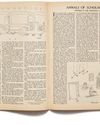
In almost every TV comedy special, there’s a telling cutaway that the director felt obliged to insert. It shows spectators in the theatre rented for the occasion—usually a half row, halfa dozen people—erupting in laughter at something outrageous that the comedian has just said while turning with quick, happy complicity to exchange a guilty glance for having done so. As often as not, someone in the row covers her face or offers an abashed look, before rocking back and forth with renewed delight. It is a heightened emotion and clearly meant to allow us, watching, to join in. Can we laugh at thaf? they ask one another, giving us permission to laugh as they laugh.
It is, in a way, a version of the canned laughter that once enwrapped every situation comedy, and which, when now encountered on ancient shows on TV Land, sounds downright eerie in its mechanical, obviously overlaid quality. The two practices arise from a common idea: that laughter is a shared, not a solitary, experience, and needs a little kindling of collectivity to catch fire.
Mere physical, unmediated laughter might be a good place to begin exploring the higher morality of comedy—for comedy, like pornography, is the rare form that has a physical end, either achieved or not. The flutter in our heart we say we feel upon viewing a great painting is largely metaphoric; the laughter in our chests which comedy elicits is not. We can easily imagine an actor who is deeply moving” but never makes us cry; it’s a different kind of moving, we say. Daniel Day-Lewis is like that.) But a clown who makes no one laugh is not a clown, or else is stuck in a Beckett play.
Bu hikaye The New Yorker dergisinin December 18, 2023 sayısından alınmıştır.
Start your 7-day Magzter GOLD free trial to access thousands of curated premium stories, and 9,000+ magazines and newspapers.
Already a subscriber ? Giriş Yap
Bu hikaye The New Yorker dergisinin December 18, 2023 sayısından alınmıştır.
Start your 7-day Magzter GOLD free trial to access thousands of curated premium stories, and 9,000+ magazines and newspapers.
Already a subscriber? Giriş Yap

SUBJECT AND OBJECT
What happened when Lillian Ross profiled Ernest Hemingway.

ROYAL FLUSH
The fall of red.

Roz Chast on George Booth's Cartoons
There's almost nothing I like more than a laughing fit. It is a non-brain response, like an orgasm or a sneeze.

CHUKA
I have always longed to be known, truly known, by another human being. Sometimes we live for years with yearnings that we cannot name.

Rachel Aviv on Janet Malcolm's "Trouble in the Archives"
As Janet Malcolm worked on \"Trouble in the Archives,\" a two-part piece about prominent psychoanalysts who disagreed about Freud, she began a correspondence with Kurt Eissler, the head of the Sigmund Freud Archives.

PERSONAL HISTORY - A VISIT TO MADAM BEDI
I was estranged from my own mother, so a friend tried to lend me his.

AMERICAN CHRONICLES - WAR OF WORDS
Editors, writers, and the making of a magazine.

LIVE FROM NEW YORK
A new docuseries commemorates fifty years of \"Saturday Night Live.\"

TANGLED WEB
An arachnophobe pays homage to the spider.

TROUBLE IN PARADISE
Mike White's mischievous morality plays.